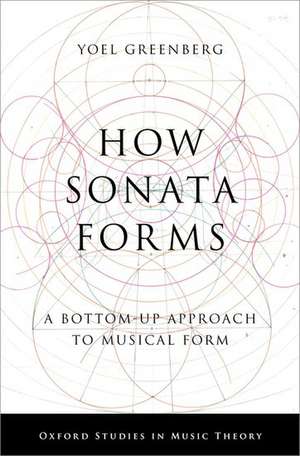How Sonata Forms: A Bottom-Up Approach to Musical Form: Oxford Studies in Music Theory
Autor Yoel Greenbergen Limba Engleză Hardback – 16 aug 2022
Din seria Oxford Studies in Music Theory
- 5%
 Preț: 276.87 lei
Preț: 276.87 lei -
 Preț: 221.07 lei
Preț: 221.07 lei - 9%
 Preț: 483.13 lei
Preț: 483.13 lei - 26%
 Preț: 368.05 lei
Preț: 368.05 lei - 12%
 Preț: 561.42 lei
Preț: 561.42 lei - 13%
 Preț: 175.76 lei
Preț: 175.76 lei - 22%
 Preț: 134.84 lei
Preț: 134.84 lei - 27%
 Preț: 372.14 lei
Preț: 372.14 lei - 28%
 Preț: 368.77 lei
Preț: 368.77 lei - 23%
 Preț: 372.55 lei
Preț: 372.55 lei -
 Preț: 340.37 lei
Preț: 340.37 lei - 14%
 Preț: 297.70 lei
Preț: 297.70 lei -
 Preț: 283.16 lei
Preț: 283.16 lei - 22%
 Preț: 328.95 lei
Preț: 328.95 lei - 12%
 Preț: 314.69 lei
Preț: 314.69 lei - 12%
 Preț: 291.71 lei
Preț: 291.71 lei - 12%
 Preț: 292.38 lei
Preț: 292.38 lei - 21%
 Preț: 349.04 lei
Preț: 349.04 lei - 22%
 Preț: 347.43 lei
Preț: 347.43 lei - 22%
 Preț: 327.26 lei
Preț: 327.26 lei -
 Preț: 352.55 lei
Preț: 352.55 lei -
 Preț: 257.59 lei
Preț: 257.59 lei - 6%
 Preț: 299.99 lei
Preț: 299.99 lei - 12%
 Preț: 323.95 lei
Preț: 323.95 lei - 9%
 Preț: 139.99 lei
Preț: 139.99 lei - 10%
 Preț: 468.75 lei
Preț: 468.75 lei - 12%
 Preț: 289.95 lei
Preț: 289.95 lei - 9%
 Preț: 476.52 lei
Preț: 476.52 lei - 25%
 Preț: 345.40 lei
Preț: 345.40 lei - 27%
 Preț: 449.20 lei
Preț: 449.20 lei - 27%
 Preț: 404.38 lei
Preț: 404.38 lei
Preț: 437.84 lei
Preț vechi: 485.55 lei
-10% Nou
Puncte Express: 657
Preț estimativ în valută:
83.81€ • 91.06$ • 70.44£
83.81€ • 91.06$ • 70.44£
Carte disponibilă
Livrare economică 19-25 martie
Preluare comenzi: 021 569.72.76
Specificații
ISBN-13: 9780197526286
ISBN-10: 0197526284
Pagini: 264
Ilustrații: 46 music examples, 50 figures
Dimensiuni: 124 x 152 x 10 mm
Greutate: 0.52 kg
Editura: Oxford University Press
Colecția OUP USA
Seria Oxford Studies in Music Theory
Locul publicării:New York, United States
ISBN-10: 0197526284
Pagini: 264
Ilustrații: 46 music examples, 50 figures
Dimensiuni: 124 x 152 x 10 mm
Greutate: 0.52 kg
Editura: Oxford University Press
Colecția OUP USA
Seria Oxford Studies in Music Theory
Locul publicării:New York, United States
Recenzii
Greenberg's inspirational book opens a window upon the genesis of sonata form and offers a tool with which to trace its further evolution. His bottom-up approach has the potential to redraw the map of this process sketched by earlier scholarship.
With this resourceful and entertaining book, Yoel Greenberg offers a brilliantly innovative approach to the evolution of musical form. Every page of How Sonata Forms is ablaze with a rare quality of mind, both highly learned and right down to earth.
Using corpus studies, statistical analyses, and an innovative evolutionary approach (with nods to Darwin and Dawkins), Greenberg's brilliant study offers entirely original—and thoroughly convincing—perspectives on the transformation of 18th-century musical forms.
An invitation to reflect on the many ways in which hierarchical/top-down paradigms have unconsciously shaped our thought-and a model for how we might flip the script in pursuit of fresh ideas and insights.
I can't remember a book about music in which I read so many sentences that I wished I had written myself... A model for future studies of sonata form's origins.
How Sonata Forms offers a wealth of methodologies, vocabularies, examples and interdisciplinary insights for scholars grappling with the limitations of sonata-form theories.
How Sonata Forms offer a robust picture of sonata-form composition in the mid-eighteenth century, introducing the reader to a great deal of new repertoire from complementary perspectives.
With this resourceful and entertaining book, Yoel Greenberg offers a brilliantly innovative approach to the evolution of musical form. Every page of How Sonata Forms is ablaze with a rare quality of mind, both highly learned and right down to earth.
Using corpus studies, statistical analyses, and an innovative evolutionary approach (with nods to Darwin and Dawkins), Greenberg's brilliant study offers entirely original—and thoroughly convincing—perspectives on the transformation of 18th-century musical forms.
An invitation to reflect on the many ways in which hierarchical/top-down paradigms have unconsciously shaped our thought-and a model for how we might flip the script in pursuit of fresh ideas and insights.
I can't remember a book about music in which I read so many sentences that I wished I had written myself... A model for future studies of sonata form's origins.
How Sonata Forms offers a wealth of methodologies, vocabularies, examples and interdisciplinary insights for scholars grappling with the limitations of sonata-form theories.
How Sonata Forms offer a robust picture of sonata-form composition in the mid-eighteenth century, introducing the reader to a great deal of new repertoire from complementary perspectives.
Notă biografică
Yoel Greenberg is a music theorist, musicologist and violist, currently serving as head of the department of music at Bar-Ilan University and violist with the Carmel Quartet. He holds a first degree in mathematics and computer science, and an MA and PhD in musicology from the Hebrew University, Jerusalem. His research concerns the rise of sonata form using corpus-based methods to inform analysis of individual works. He has also published articles about music and the arts in the early twentieth century, and Jewish music. Greenberg is dedicated to public musical education and presents, together with the Carmel Quartet, the critically acclaimed series of concert-lectures, Strings and More.
